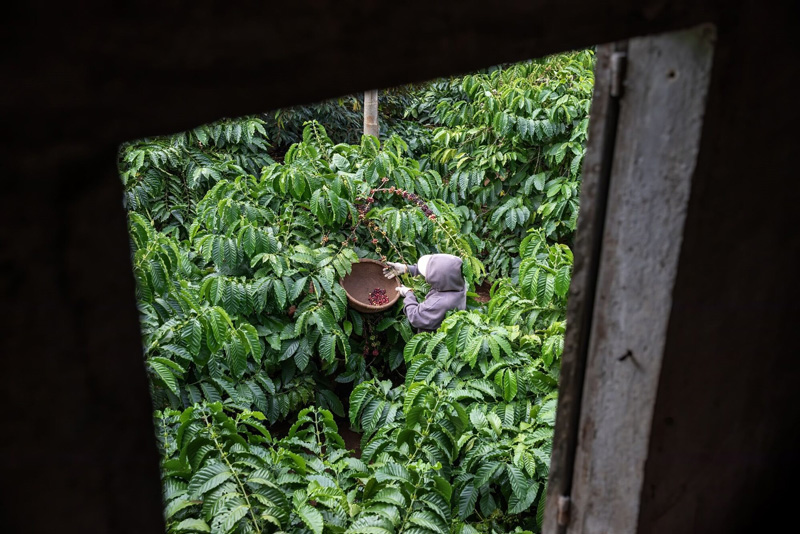Concerned about coffee yield and flavor
Coffee is an industry worth about $200 billion, spanning from small farms across Brazil and Indonesia to roasters and finished products, like Nestlé. Traditionally, beverage chains - such as Starbucks - favor the milder, more aromatic Arabica variety, while Robusta is often used for instant coffee.
However, unusual weather is putting crops at risk globally. Stronger coffees - like Robusta - are likely to cost more. However, in Vietnam, the world's leading producer of hard Robusta coffee, erratic climate causes considerable difficulties for coffee farmers.

Workers harvest coffee at a farm in Buon Ma Thuot, Dak Lak. Photo: Bloomberg
Harsher growing conditions have left many Vietnamese farmers concerned about coffee's value as a profitable crop, while some have cut down coffee to grow pepper and durian. This causes supply to decrease, pushing Robusta coffee prices this year to the highest level since 2008. Meanwhile, rising temperatures cause future coffee production to decrease.
Besides concerns about coffee output, consumers will have to get used to a different flavor. According to a 2022 study of tropical crops, including Arabica coffee, avocados and cashews, coffee is most vulnerable to climate change, as rising temperatures reduce the area suitable for production. export this plant globally. Researchers believe it is necessary to adapt, proposing to replace Arabica coffee with Robusta coffee, which can withstand heat better.
Nestlé, the Swiss maker of Nespresso and Nescafe, is among the companies facing this change. During a visit to a number of Vietnamese coffee farms, Mr. Philipp Navratil - Director of Nestlé's Coffee Business Strategy Department said that according to forecasts, in the next 30 years, if climate change does not If resolved, 50% of the coffee growing land that we know today will no longer be able to produce coffee.
Nestlé is a large consumer of Robusta coffee. It is estimated that around the world, every second, consumers drink more than 6,000 cups of Nescafe. Nestlé spends 700 million USD/year to buy about 1/4 of Vietnam's total coffee output.
However, according to an October report by World Coffee Research, with increasing consumption trends and the impact of climate change on production, by 2040, the world may face shortages of up to 35 million bags of Robusta coffee. Currently, the world produces nearly 80 million bags of Robusta coffee each year.
Encourage coffee growers to practice sustainable farming
According to World Coffee Research, changing weather patterns could significantly reduce productivity, which would leave millions of smallholder farmers - who produce 60% of the world's coffee - vulnerable. facing economic and food insecurity.
In 2021, authors from many organizations, including a Vietnamese university, published a study showing that prolonged dry periods in Vietnam and irrigation water shortages in recent years have seriously affecting the productivity of Robusta coffee farms in the Central Highlands. The whole country is also preparing to cope with the impact of El Nino in the coming months.
Facing the challenge of water shortages and rising temperatures, Ms. Tran Thi Lien, 46 years old, owner of a one-hectare coffee farm in Dak Lak province, Central Highlands, sees sustainable farming methods. is more effective. She and her neighbors cut back on chemical fertilizers and created shade for the coffee trees so they are less exposed to harsh sunlight. In addition, she also grows black pepper and betel to diversify the area.
In the context of harsh weather threatening crops and to adapt to climate change, in 2022, Nestlé announced that it will invest about 1.2 billion USD through 2030 to encourage coffee growers to supply Their Nescafe brand uses more sustainable farming methods. This includes replacing existing trees with varieties that can better cope with weather fluctuations.
“Robusta is not an absolute solution to the problem of climate change,” said Jennifer Vern Long, CEO of World Coffee Research, an organization founded by the global coffee industry in 2012. Although Robusta is more heat tolerant and more resistant to some pests, we are still learning the limits of this coffee.”
Source: baotainguyenmoitruong.vn


